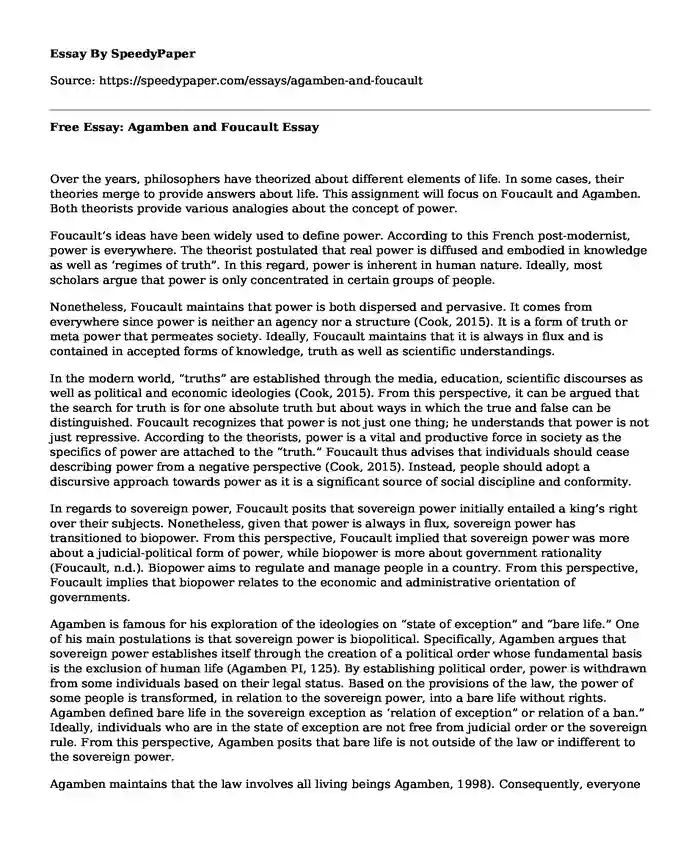
| Essay type: | Compare and contrast |
| Categories: | Politics Philosophers |
| Pages: | 3 |
| Wordcount: | 699 words |
Over the years, philosophers have theorized about different elements of life. In some cases, their theories merge to provide answers about life. This assignment will focus on Foucault and Agamben. Both theorists provide various analogies about the concept of power.
Foucault’s ideas have been widely used to define power. According to this French post-modernist, power is everywhere. The theorist postulated that real power is diffused and embodied in knowledge as well as ‘regimes of truth”. In this regard, power is inherent in human nature. Ideally, most scholars argue that power is only concentrated in certain groups of people.
Nonetheless, Foucault maintains that power is both dispersed and pervasive. It comes from everywhere since power is neither an agency nor a structure (Cook, 2015). It is a form of truth or meta power that permeates society. Ideally, Foucault maintains that it is always in flux and is contained in accepted forms of knowledge, truth as well as scientific understandings.
In the modern world, “truths” are established through the media, education, scientific discourses as well as political and economic ideologies (Cook, 2015). From this perspective, it can be argued that the search for truth is for one absolute truth but about ways in which the true and false can be distinguished. Foucault recognizes that power is not just one thing; he understands that power is not just repressive. According to the theorists, power is a vital and productive force in society as the specifics of power are attached to the “truth.” Foucault thus advises that individuals should cease describing power from a negative perspective (Cook, 2015). Instead, people should adopt a discursive approach towards power as it is a significant source of social discipline and conformity.
In regards to sovereign power, Foucault posits that sovereign power initially entailed a king’s right over their subjects. Nonetheless, given that power is always in flux, sovereign power has transitioned to biopower. From this perspective, Foucault implied that sovereign power was more about a judicial-political form of power, while biopower is more about government rationality (Foucault, n.d.). Biopower aims to regulate and manage people in a country. From this perspective, Foucault implies that biopower relates to the economic and administrative orientation of governments.
Agamben is famous for his exploration of the ideologies on “state of exception” and “bare life.” One of his main postulations is that sovereign power is biopolitical. Specifically, Agamben argues that sovereign power establishes itself through the creation of a political order whose fundamental basis is the exclusion of human life (Agamben PI, 125). By establishing political order, power is withdrawn from some individuals based on their legal status. Based on the provisions of the law, the power of some people is transformed, in relation to the sovereign power, into a bare life without rights. Agamben defined bare life in the sovereign exception as ‘relation of exception” or relation of a ban.” Ideally, individuals who are in the state of exception are not free from judicial order or the sovereign rule. From this perspective, Agamben posits that bare life is not outside of the law or indifferent to the sovereign power.
Agamben maintains that the law involves all living beings Agamben, 1998). Consequently, everyone is bound by the law (Agamben PI, 121). While bare life is excluded from the sovereign power, it is tied to the judicial order in its exclusion. Bare life is tied to the sovereign power by which it is constituted.
Both Agamben and Foucault presented various ideas on the concept of power. Ordinarily, Agamben attempted to expound beyond Foucault’s work. Nonetheless, his works are more centered on politics and political theory, as well as legal studies. Agamben appreciates and recognizes Foucault’s distinction of biopower and sovereign power. Given both perspectives, what would Foucault say about Agamben’s ideology that sovereign power has not abandoned politics?
References
Agamben, G. (1998). Sovereign power and bare life. Stanford University Press.
Cook, D. (2015). “Is power always secondary to the economy?” Foucault and Adorno on Power and Exchange. Foucault Studies, 180-198. https://doi.org/10.22439/fs.v0i0.4936Foucault, M. The history of sexuality.
Cite this page
Free Essay: Agamben and Foucault. (2023, Oct 31). Retrieved from https://speedypaper.com/essays/agamben-and-foucault
Request Removal
If you are the original author of this essay and no longer wish to have it published on the SpeedyPaper website, please click below to request its removal:
- Free Essay on Leadership and Cognitive Bias
- Free Essay on Online Shopping Intention
- Free Essay. Business-Government Relations and the Political Environment
- Essay Sample on Performance and Status Quo in Communication
- Paper Example. Mysticism and Spirituality
- Essay Sample on Health Promotion in African American Population
- Who Should Govern Kashmir - Paper Sample
Popular categories




